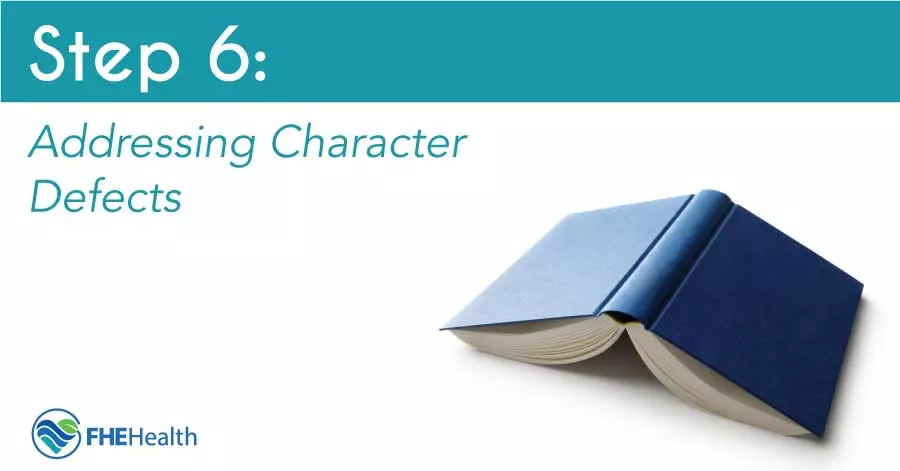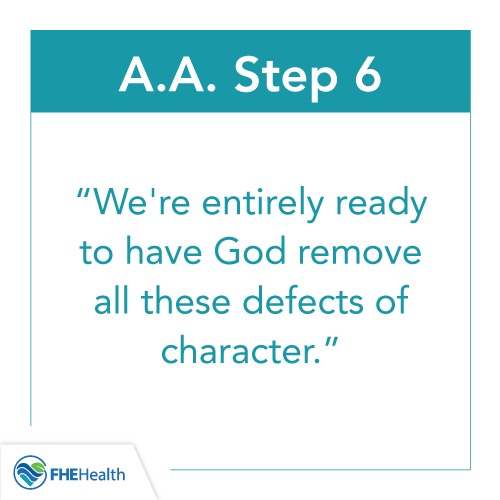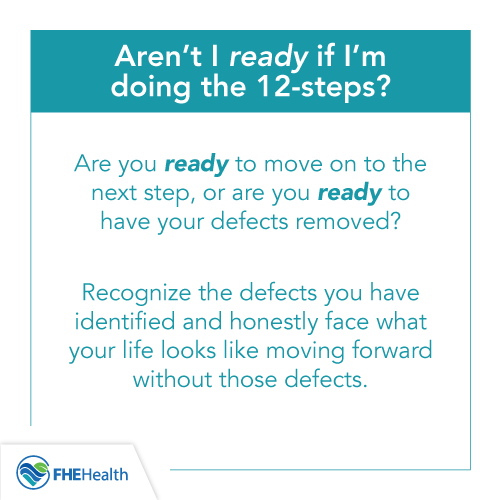
Embracing change means making commitments to yourself to rid your life of your defects and faults. In the 12-Step Program, Step 6 focuses on this key topic.
What Is Step 6 of the 12 Steps and What Does It Mean?
 Are you ready for a change? It seems like a simple statement, but Step 6 of AA (Alcoholics Anonymous) asks you to do more. It reads, “We’re entirely ready to have God remove all these defects of character.”
Are you ready for a change? It seems like a simple statement, but Step 6 of AA (Alcoholics Anonymous) asks you to do more. It reads, “We’re entirely ready to have God remove all these defects of character.”
In steps 4 and 5, you worked through understanding more about yourself and more of what you need to remove from your life to move forward. In Step 6, you learn how to cut out all of these things with the help of a higher power, getting rid of what’s holding you back.
What is the value of this step? In its simplest form, it focuses on determining what your real character is and your true willingness to overcome defects to recover from addiction.
It’s Pretty Easy to Be “Ready.” Can I Skip This Step?
Deciding to be ready isn’t simple; it takes a significant change in your thought patterns and behaviors to become ready. Once you work through this step, you find yourself noticeably different, including the way you think of yourself and of your future. That’s because it takes a hard, determined decision to move forward in this step.
It’s all about commitment. It’s about recognizing the defects in your character that have brought you to this point and making the conscious decision to step away from those attributes for good. Don’t overlook this step or move quickly through it. Expect it to be challenging. Ask yourself honestly, are you ready to finish the step, or are you ready to have your defects removed?
What It Means to Be “Ready to Have Our Defects Removed”
 First, consider the word “ready.” You’ve worked this far in the 12 Step Program. You may think you’re ready to move forward, but that’s not the meaning of this word to focus on. View it as being ready for the unknown, being prepared for what’s ahead and being open to change. It’s also important to be truly committed to leaving behind what brought you to this point.
First, consider the word “ready.” You’ve worked this far in the 12 Step Program. You may think you’re ready to move forward, but that’s not the meaning of this word to focus on. View it as being ready for the unknown, being prepared for what’s ahead and being open to change. It’s also important to be truly committed to leaving behind what brought you to this point.
You’ve seen the patterns in your behavior that have brought you here, and you know that not changing those patterns is only going to continue the same process. Instead, be ready to remove those defects fully from your day-to-day life.
What Are Character Defects?
Next, focus on your defects that we’ve previously identified. Character defects aren’t as simple as they seem and we need to be thorough with our understanding of them. Every person has needs; it’s human nature. It’s not those needs that are defects. Rather, it is the way we work toward meeting those needs that leads to character defects.
Many times, these defects are deeply rooted in emotional and mental health. Most commonly, these defects revolve around the following shortcomings:
- Anger
- Gluttony
- Greed
- Fear
- Pride of self
- Jealousy
- Willfulness
- Lust
- Dishonesty
 To be successful in Step 6, you must not only recognize your defects but also commit to removing them from your future. Be honest with yourself. Every person has experienced many of these behaviors. And when you express them through addiction, they change who you are, how you think and what you do. Even with an addiction, you must work through these defects to truly recover.
To be successful in Step 6, you must not only recognize your defects but also commit to removing them from your future. Be honest with yourself. Every person has experienced many of these behaviors. And when you express them through addiction, they change who you are, how you think and what you do. Even with an addiction, you must work through these defects to truly recover.
It seems so hard to do this. Yet, doing so means achieving a better sense of worth. Many people struggle to accomplish this step. You may feel as if you can’t resolve all of your defects fast enough. You may feel you can get rid of greed or dishonesty for a short time, but they always seem to weigh on you long-term.
Push aside these fears. Instead, realize that you aren’t meant to resolve these problems instantly. It’s more about taking small steps toward improving your character faults. It’s also important to recognize that having character defects doesn’t mean you’re defective. Rather, they show the areas you need to focus on.
The best way for achieving Step 6 success is to keep your mind open. Don’t shut down as you begin to reveal these flaws. Don’t give up when you struggle to remove them from your life for good. Remember that it’s a journey.
Worksheet for Step 6
To get started, recognize that you’ve probably been carrying a lot of baggage around with you related to these shortcomings. You feel it, but dealing with it now means you’ll be in a better position to avoid relapse later. Make the decision to remove these shortcomings from your life, one day at a time.
Next, let go. Stop blaming yourself for these shortcomings and dwelling on them. Focusing on the negative — that you used or drank too much — isn’t going to improve your future. You need to enter Step 6 with a decisive and positive attitude that you are going to change. Then, hold on to a sense of hope. Trust in the program and in your long term recovery.
Start with this Step 6 worksheet of basic questions. They’re meant to help you begin thinking about the future.
- Which character defects impact your life? Are you afraid of removing them? Are you worried you can’t? If that’s the case, take a look deeper to understand why.
- How can your higher power help you to remove them? If a higher power can help you to heal and overcome these shortcomings, are you willing to allow that to occur?
- What is your daily responsibility in addressing these challenges? What can you do to ensure you aren’t making these defects a part of your day?
- Do your character defects remain because you enjoy what they bring to you? If so, why? What can you do to find that joy somewhere else?
- Do you believe you can change? If you remove all of these defects, what do you see as your future? Is that goal worth the work?
Work closely with your team to understand what your character flaws are and how to change your thought patterns to give yourself a better future. Your recovery relies on your ability to address, release and move forward on these defects to be ready for your future.
Our 12-Step Series:
- Why the 12-step Program Still Works
- Step 1: Why the 12-step Journey Begins with Powerlessness
- Step 2: What is a Higher Power?
- Step 3: God as you Understand Him
- Step 4: Your Moral Inventory
- Step 5: Admitting Your Wrongs
- Step 6: Addressing Character Defects
- Step 7: Removing our Defects
- Step 8
- Step 9: Making Amends, How to Approach Step 9
- Step 10: Ongoing Inventory
- Step 11: Deepening Your Connection with a Higher Power
- Step 12: Sharing your Spiritual Awakening
- Understanding AA Lingo
Get Started with FHE Health
If you’re reading this, you’ve already made an important step toward recovery: taking the time to learn more about what’s asked of you for lifelong sobriety. If you or a loved one are struggling with addiction, FHE Health can help. We have life-saving inpatient and outpatient treatment programs that can help you start your own journey to recovery. Contact us today.






